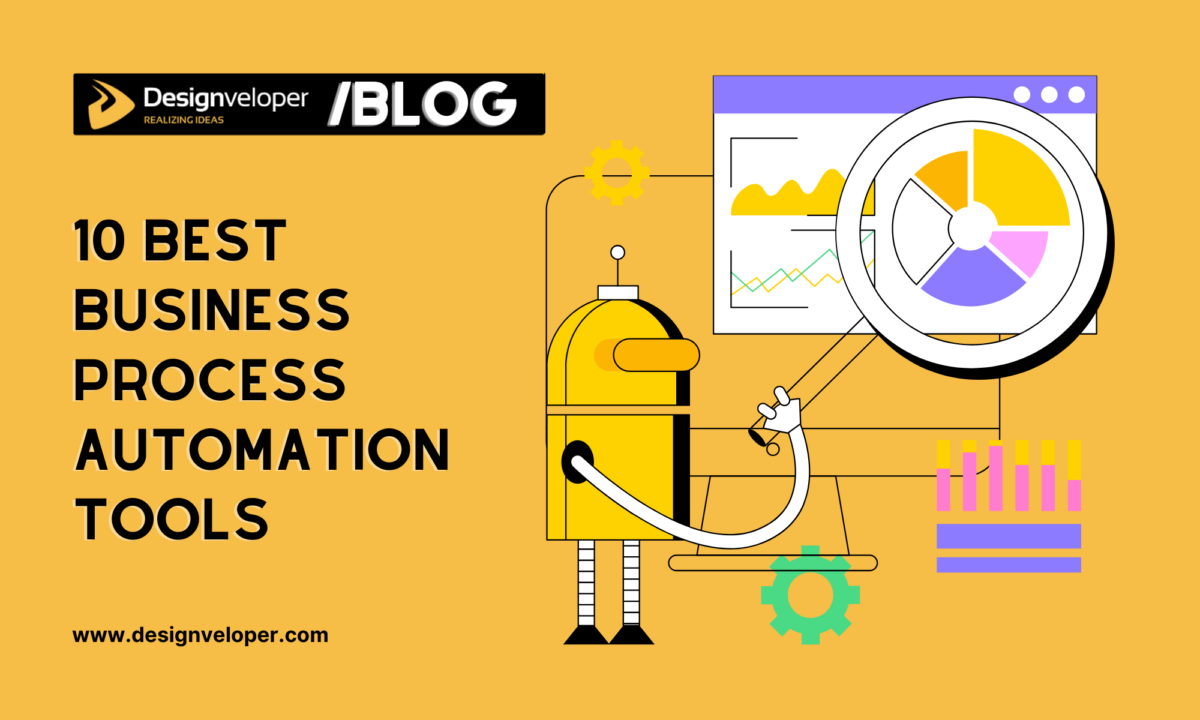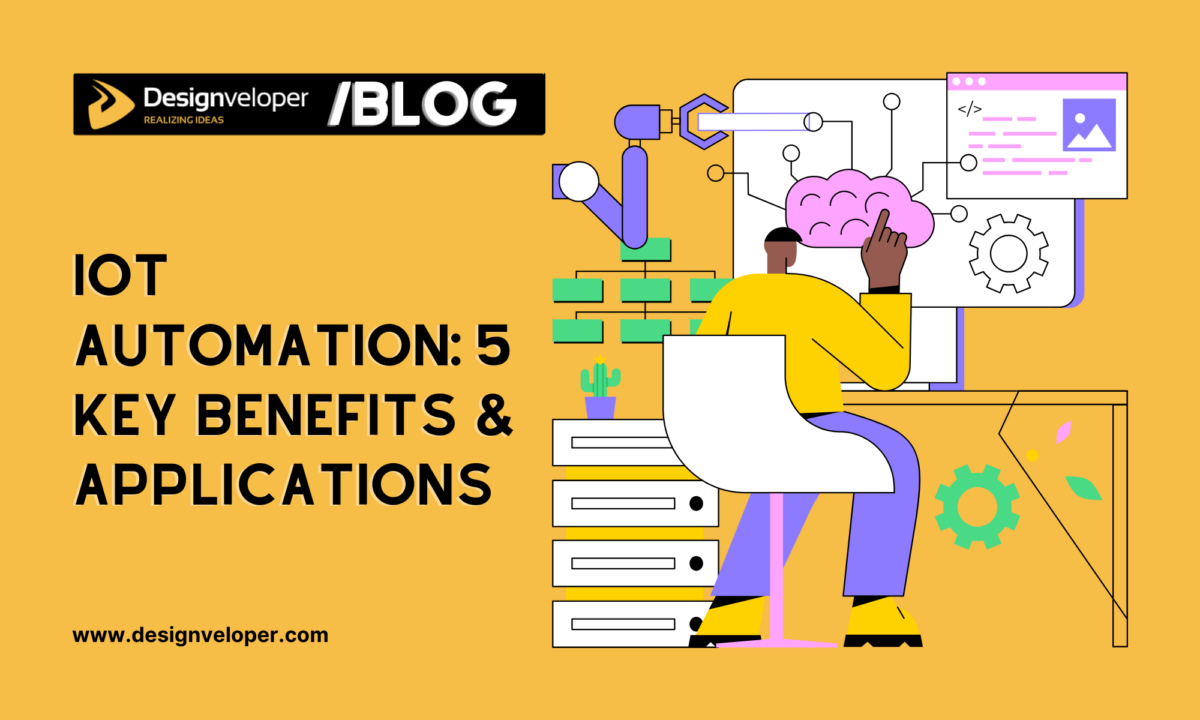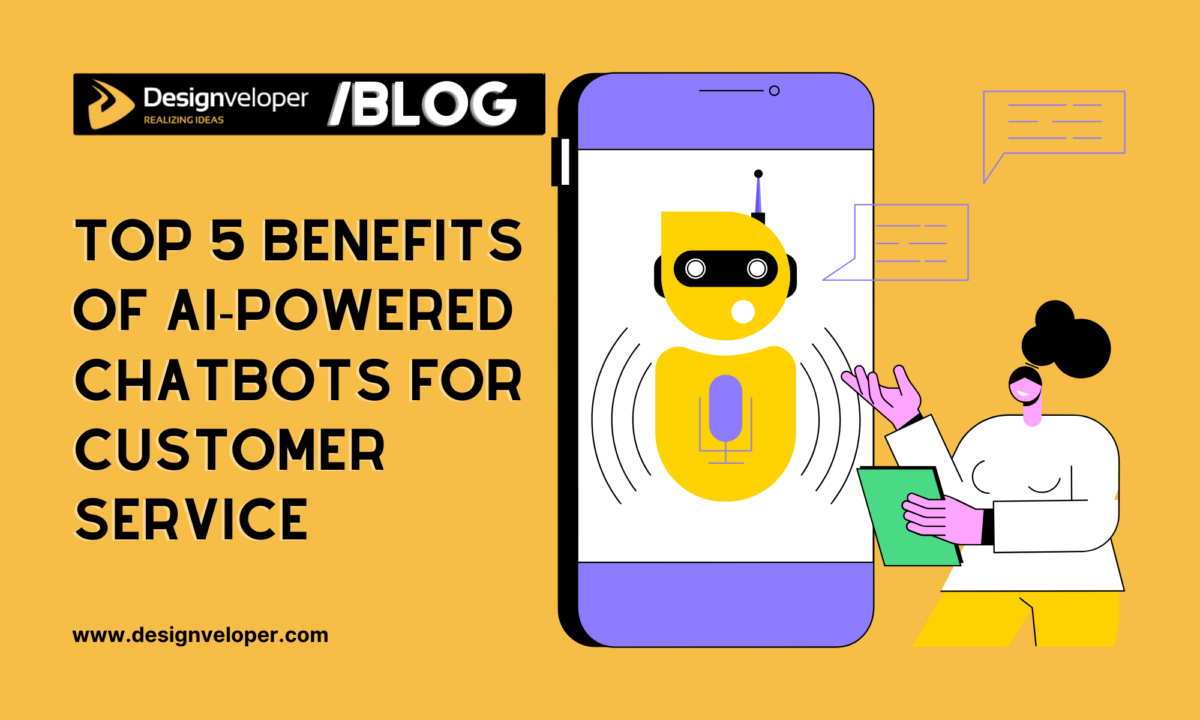10 Best Business Process Automation Tools to Consider in 2025
April 19, 2025
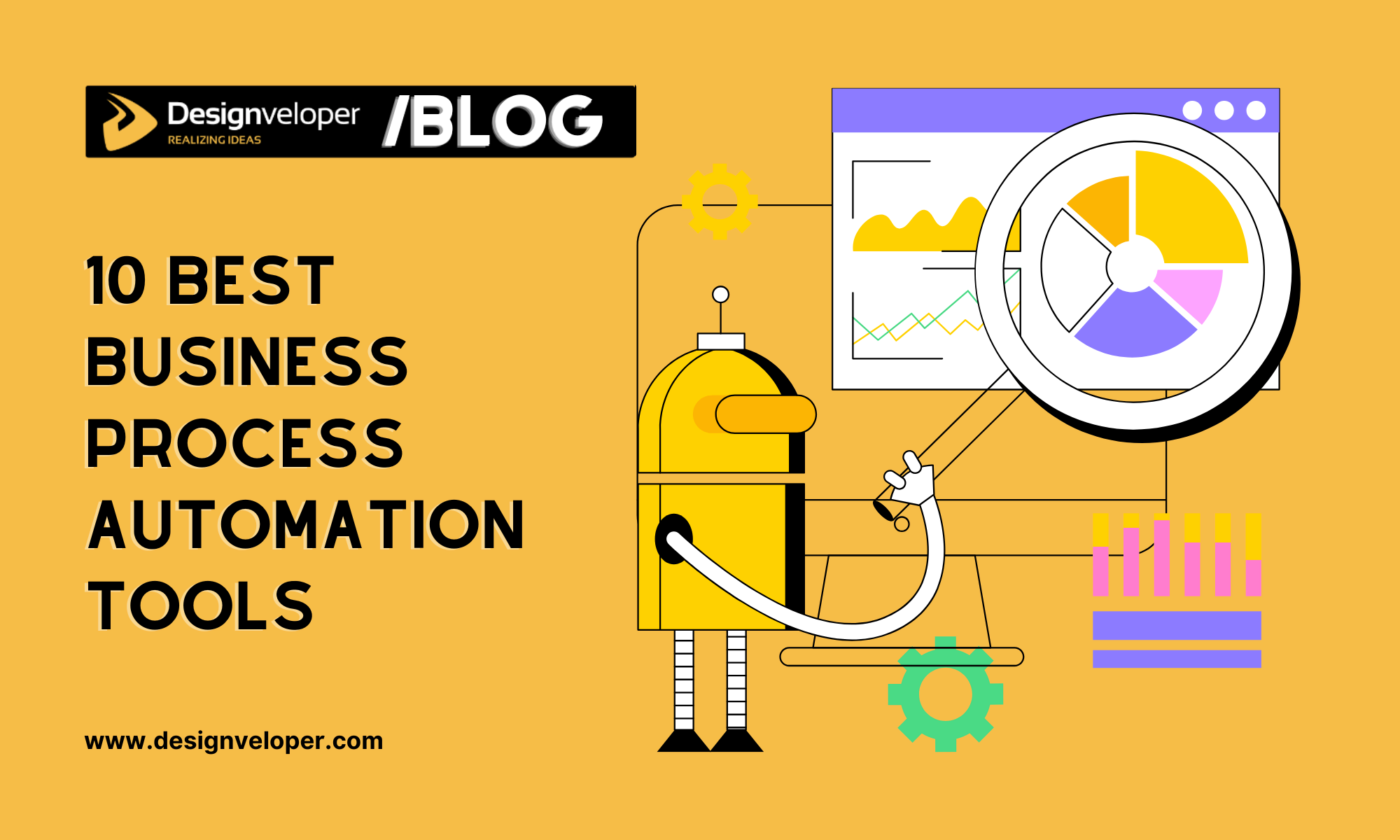

Do you feel overwhelmed with handling piles of business tasks manually yet achieve operational inefficiency? If yes, this is not only your current problem. Many businesses out there are struggling with day-to-day operations, from invoicing processes to customer support. Therefore, they’re looking for a wiser solution to stay productive while ensuring good outcomes: that’s business process automation tools. So, what are these tools, exactly, and which ones are the best to automate your business processes? Let’s find them out in today’s article!
What is a Business Process Automation Tool, and Why Does Your Company Need One?
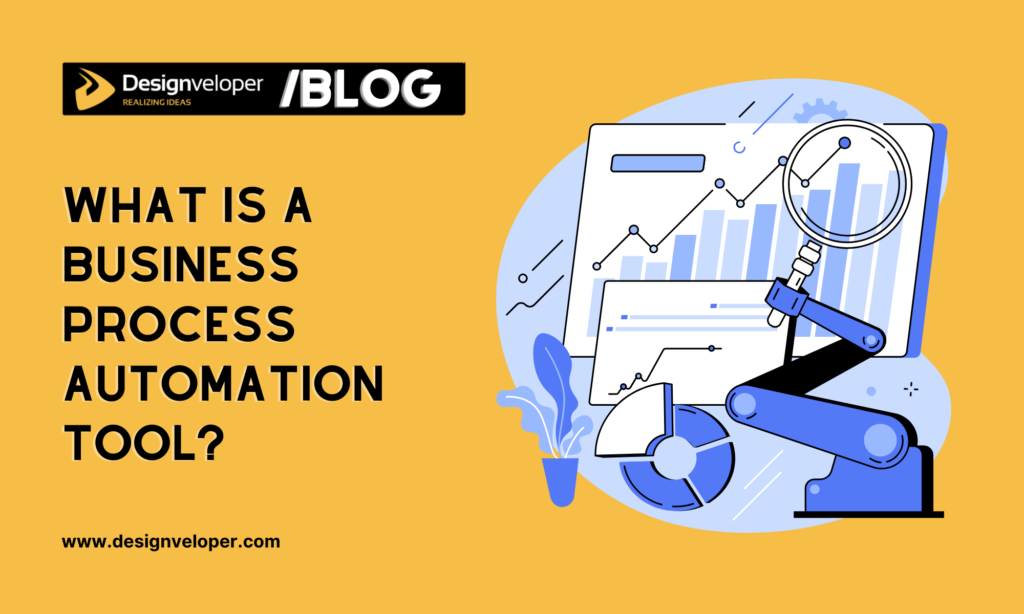
As the name states, a typical business process automation (BPA) tool is mainly responsible for automating business processes like invoice processing, employee onboarding, and customer service.
BPA tools work by using advanced technologies like AI/ML and RPA (Robotic Process Automation) to perform daily, repetitive tasks based on predefined rules. Particularly, these “smart” tools can automatically retrieve data from different sources (documents, emails, etc.) and enter the data into spreadsheets, databases, or CRM systems. They can automatically generate reports, handle common customer inquiries, update client profiles, make invoice payments, and more.
BPA tools can handle repetitive, time-consuming tasks at a lightning speed but with high precision. Therefore, your company can achieve the following benefits when using these tools:
- Increase operational efficiency and employee productivity;
- Reduce costs and human errors;
- Improve compliance with company policies and industry regulations;
- Enhance customer satisfaction;
- Give human employees more time to focus on strategic, creative tasks.
How to Choose the Right Automation Tool for Business Processes
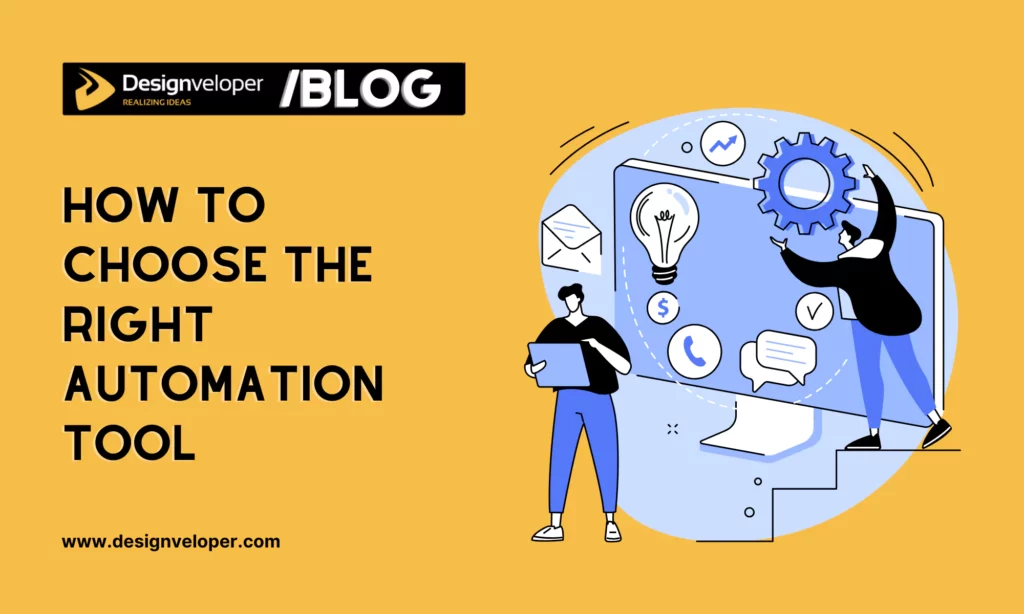
Today, the demand for operational efficiency is growing, leading to an increase in business process automation tools and services. One research study forecasted that their global revenue will exceed $15 billion in 2025 and continue to rise 11.7% annually in subsequent years. However, not all tools are suitable for your business processes. To pick the best fit, you should consider your specific requirements and needs by asking yourself the following questions:
- What is your technical expertise? Select a business process automation tool that fits your team’s coding skills. For example, for non-technical users, the tool needs to have a drag-and-drop editor, pre-built templates, and AI bots to support process automation.
- Are your business processes complex? Complex processes often involve dozens of steps, huge data volumes, interactions with various systems, and multiple decision points. This requires a tool that can handle these complex processes.
- What are your budget constraints? Consider your budget and compare pricing plans of different BPA tools. Also, evaluate whether there’s any hidden cost, for example, related to installation, training, or ongoing maintenance.
- Do you want to integrate the tool with current systems? Assess whether the chosen BPA tool can be incorporated seamlessly into your existing infrastructure and external systems.
Top 10 Business Process Automation Tools in 2025
You’ve understood what business process automation tools are and how to choose the right one for your business needs. Now, let’s discover the top ten BPA tools to consider in 2025:
1. Kissflow
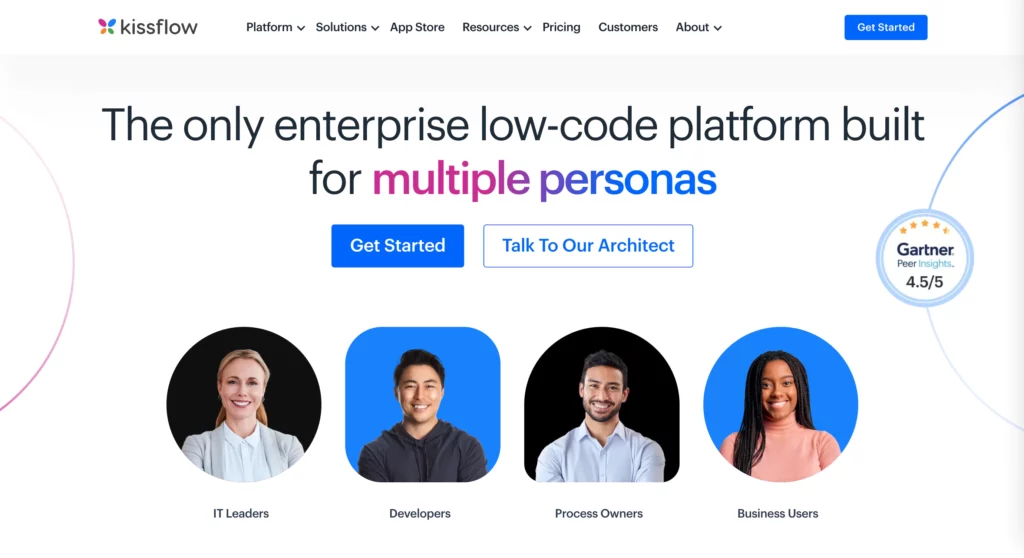
Kissflow is one of the best user-friendly platforms as it offers no-code/low-code capabilities for even non-technical users to automate business processes. Particularly, you can use Smart Boards to establish triggers, conditions, and automated approvals. This allows you to build and manage freestyle workflows or projects without coding knowledge. With intuitive dashboards and real-time analytics, you can easily track process performance and spot bottlenecks that result in operational inefficiency.
Kissflow also allows you to fully customize forms that align with any of your business processes and needs. You can assign who can start a process and which data users can see or edit at each step. Also, the tool enables data collection anywhere, even from mobile devices, and connects form data directly with your current systems.
Don’t worry if you have complex business processes. Kissflow offers integration capabilities to seamlessly connect processes from different sources to streamline multi-step, multi-system operations without code. The tool also integrates GenAI to create working processes based on business requirements and automate daily tasks by leveraging simple human language prompts.
Pricing: Kissflow now includes two pricing plans. They include Basic at $1,500/month (for 50 internal users and simple use cases) and Enterprise with custom prices. Both come with a free trial.
2. Pipefy
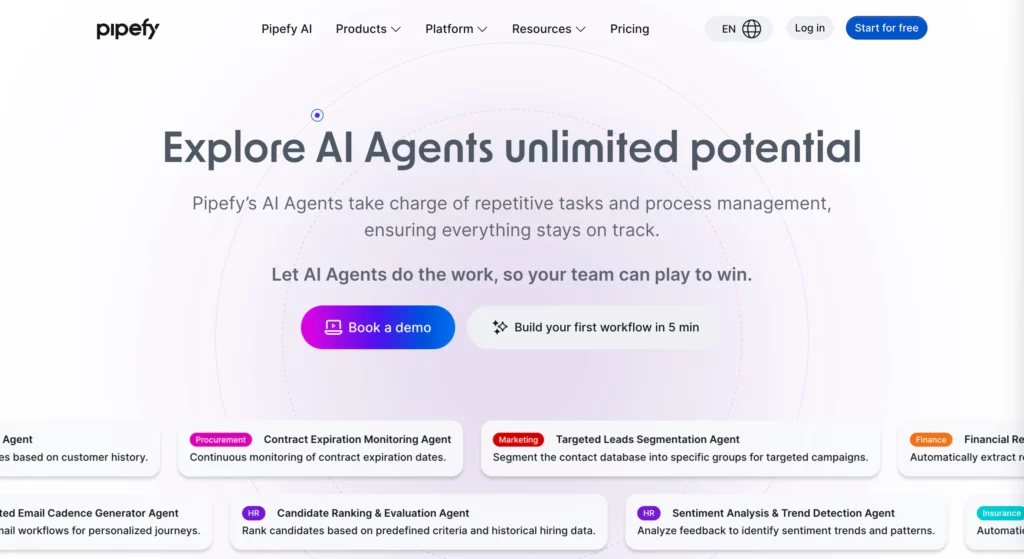
Pipefy is an excellent tool that helps your business automatically deploy different processes like employee onboarding, procurement, budget management & approvals, and pipeline management.
With the assistance of Pipefy AI and a drag-and-drop interface, you can build custom processes in minutes, visualize workflows, assign tasks smoothly, set deadlines, and measure results. Besides, you can set rules to trigger task automation. For example, when a client profile comes into the “Approved” phase, an email with the proposal will be automatically sent to the client.
Pipefy also helps you retrieve real-time data for valuable insights with zero code, create forms with available templates, and connect business processes. Further, it enables seamless integration with your favorite tools – whether they’re legacy systems, spreadsheets, or ERPs.
Pricing: Pipefy now offers a forever-free plan, Starter, for a small team of up to 10 users with 5 processes. Further, its paid plans include Business, Enterprise, and Unlimited, with different packages of features.
3. Microsoft Power Automate
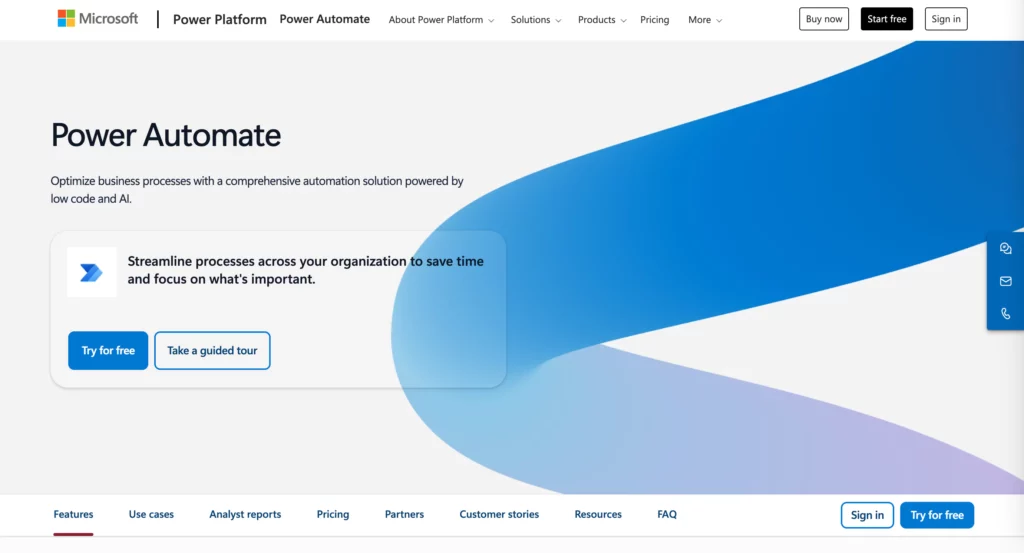
Microsoft Power Automate is a comprehensive solution to optimize your business processes with AI and automation capabilities. Particularly:
- AI Features: Using Copilot, the tool can build, edit, and expand process automation as well as automate routine tasks. Further, it can help you discover bottlenecks in your business processes and recommend suitable solutions.
- RPA (Robotic Process Automation): You can leverage RPA and prebuilt or custom user-interface actions to automate legacy systems and bot deployment.
- DPA (Digital Process Automation): The tool provides DPA to automatically run apps, services, and data on premises or in the cloud. Further, you can use 1,000+ API connectors, Microsoft 365 group templates, and available templates to set triggers for specific tasks (e.g., scheduling meetings from messages in Microsoft Teams). These powerful tools help you implement any process effectively within your business, whether it’s an accounts receivable process or a SAP procure to pay (P2P) process.
Additionally, Microsoft Power Automation provides real-time analytics through maps and dashboards to track your process’s performance, identify problems, and discover new opportunities.
Pricing: Microsoft Power Automate has three paid plans: Premium at $15/user/month, Process at $150/bot/month, and Hosted Process at $215/bot/month (billed annually). Further, it offers a 30-day free trial.
4. Bizagi
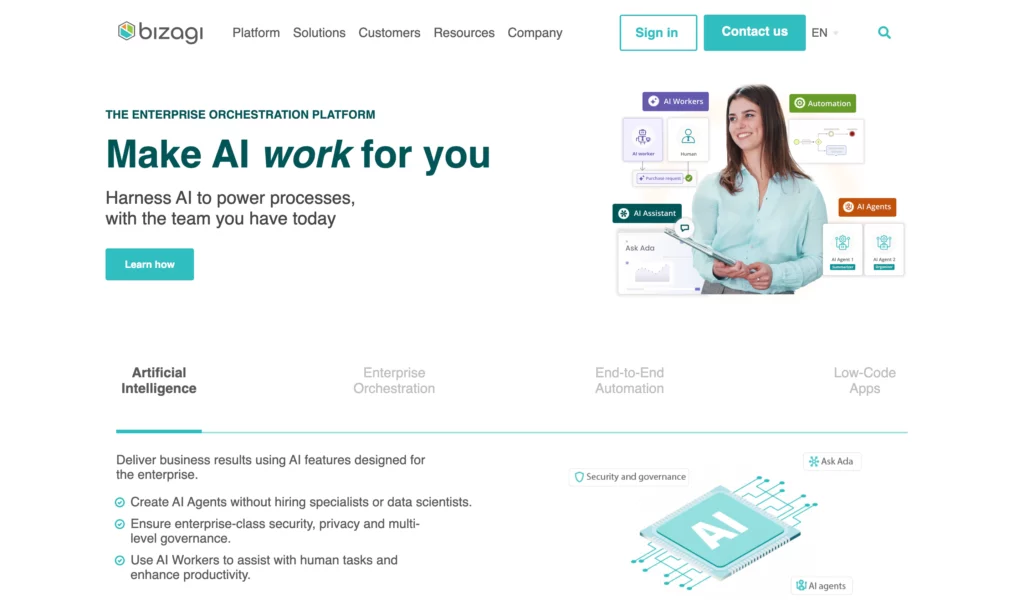
Bizagi is one of the best low-code tools to automate business processes like supply chain, customer service, finance & accounting, and human resources. Trusted by the world’s leading companies like Adidas, Unilever, and DHL Group, Bizagi streamlines business workflows with end-to-end automation services, from processing mining and modeling to visual development and AI-powered automation. Particularly, it can:
- Create BPMN diagrams based on your uploaded event logs to gain real-time insights into how your processes truly work.
- Map out each process step and publish process diagrams in different file formats.
- Run various “what-if” scenarios to simulate your processes.
- Turn your processes into low-code enterprise apps by dragging and dropping prebuilt elements or customizing app elements in Bizagi Studio (e.g., data objects or business rules). These apps help you automate specific tasks based on business rules, for example, automatically approving applicants with good credit scores.
Further, Bizagi allows you to build AI agents that inject automation into your business processes and boost productivity. These agents can generate custom content (e.g., emails or knowledge base articles), summarize documents, organize tasks, translate texts, and more.
Pricing: Bizagi’s pricing isn’t disclosed. But the tool offers different pricing packages based on consumption, usage, and the demand for unlimited users & apps.
5. Nintex
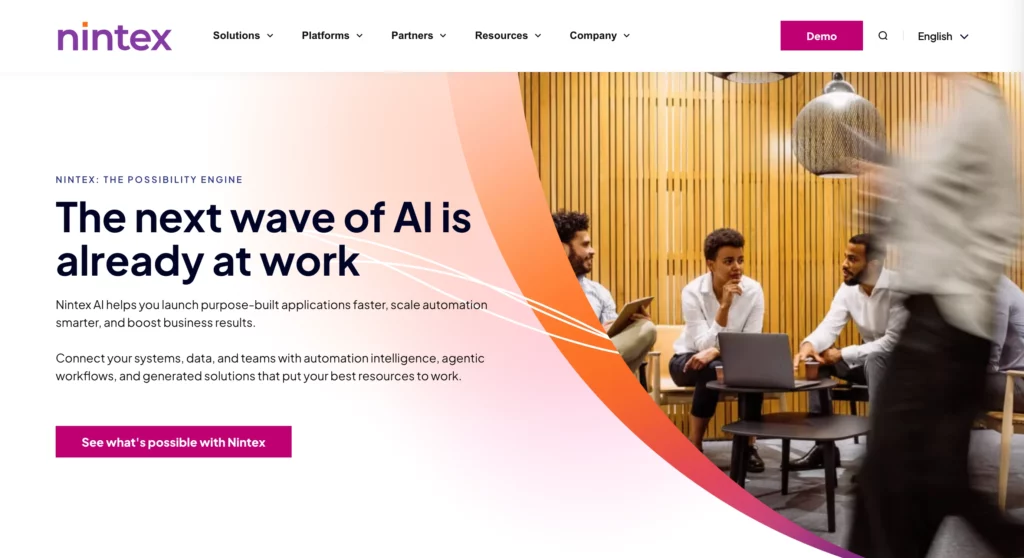
Nintex is an end-to-end automation platform powered by AI technologies to streamline processes across departments within your business. Whether it’s about loan processing, business continuity planning, employee onboarding, or policy underwriting, Nintex can help you automate and optimize these processes effectively.
The tool can be deployed in the cloud (“Nintex Automation CE”) or on premises (“Nintex Automation K2”). It has powerful capabilities to simplify sophisticated workflows:
- Drag-and-drop tools to develop, deploy, and monitor your complex, multi-step processes across systems without coding. Accordingly, these tools allow for building digital forms, generating and routing documents for signing and approval, etc.
- Low-code app development to create logic flows to act on your data instantly if specific conditions are met.
- AI-powered Process Capture to automatically convert your daily routines into scalable processes and document them in real-time. This helps ensure compliance with process standards, identify bottlenecks fast, and enhance business operations.
- Document automation & eSign that automatically creates and sends documents (e.g., invoices, quotes, or contracts) to the right person for signing, review, or secure storage.
- RPA (Nintex bots) to process repetitive, routine tasks 24/7 or provide detailed steps for employees to complete their jobs effectively.
Pricing: Nintex doesn’t publish pricing plans for its offerings, yet all its products come with a free trial.
6. Zapier
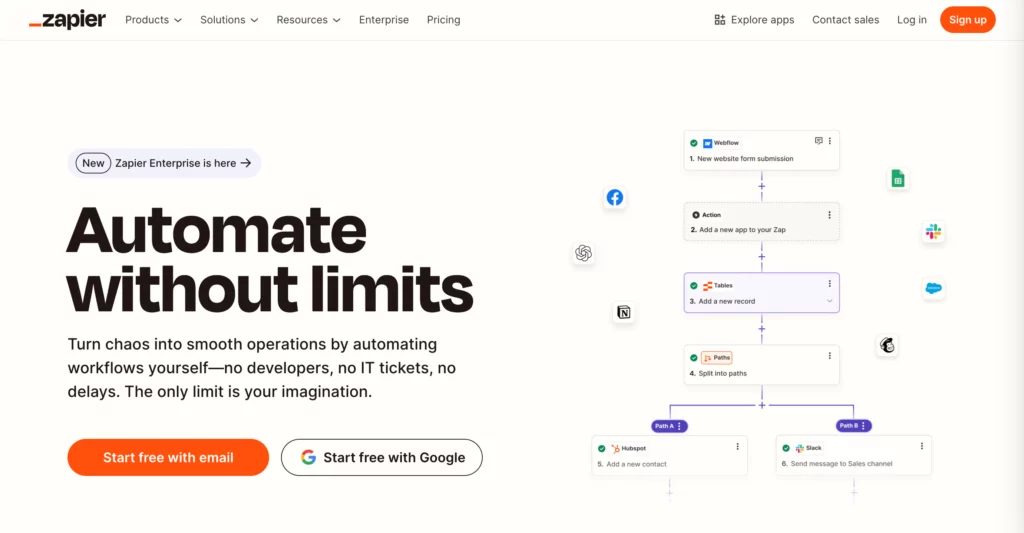
Zapier is the all-in-one business process automation tool for different use cases like lead management, sales pipelines, or tickets and incidents. It simplifies sophisticated workflows with powerful capabilities like Zapier’s AI Copilot and a drag-and-drop interface. Here’s how you can automate workflows with Zapier:
- Build an automated process by connecting two apps (one trigger and one action) from 7,000+ integrated apps (e.g., Slack, Todoist, or Google Sheets).
- Describe your desired workflow with Zapier’s AI Copilot and let it build.
- Leverage built-in tools to add logic and power to your process.
- Add paths to implement different actions based on if/then logic.
This simple process allows you to automate your workflows faster with zero code, such as generating to-do’s from Slack reactions, drafting email replies to customers, and summarizing PDF files. Further, you can add AI-powered chatbots to complete tasks quickly, Interfaces to collect data, and Tables to secure and act on data easily.
Pricing: Zapier offers a forever-free plan for basic use cases and no more than 100 tasks per month. Further, it comes with three paid plans: Professional at $19.99/month (with at least 750 tasks), Team at $69/month (with 2000 tasks), and Enterprise (contact sales). Further, add-ons related to tables, chatbots, and interfaces cost an extra $20.
7. ProcessMaker
This award-winning platform allows your business to discover, develop, and document any simple or complex processes easily. Whether you’re a developer with deep coding knowledge or a business owner with zero code, ProcessMaker is a good choice. It’s accordingly suitable for departments like finance (invoice management, purchase requests), HR (employee onboarding, expense reimbursement), and IT (CI/CD testing, quality assurance).
By leveraging AI capabilities and drag-and-drop tools, ProcessMaker allows you to automate any processes by using natural language prompts or adding pre-made objects. Further, you can use AI to extract data and transform images into processes in minutes. Through real-time dashboards, you can track how automated workflows perform.
Pricing: ProcessMaker offers three paid plans – Standard, Professional, and Enterprise – but doesn’t publish its pricing plans.
8. Pega
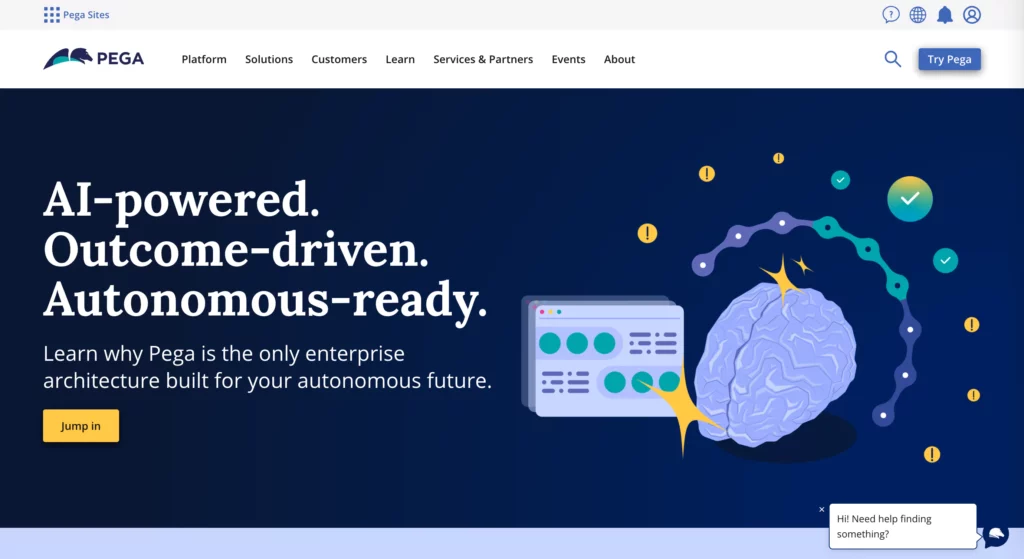
Pega Platform™ allows you to build, modify, and scale different business processes automatically. Whether it’s about engaging customers, streamlining operations, or automating customer support, the tool can help you handle these workflows easily with powerful capabilities as follows:
- Robotic Automation: Automate routine, time-consuming tasks based on preset rules. Further, this feature integrates your legacy systems smoothly and break down data silos to extract information.
- Process AI: This AI capability is injected to automate work, understand your business processes, and offer real-time insights based on data points. This not only simplifies complex decision-making but also improves operational efficiency and delivers better business outcomes.
- Email Bot: Understand a customer’s request emails (e.g., changing an address or needing a new card). It then automatically creates the corresponding customer case, evaluates its urgency level, and sends the case to the right person or an automated system for resolving.
- Pega GenAI™: Automatically convert your ideas into workflows by describing your business problem and adding legacy knowledge. Further, this AI chatbot offers real-time, contextual answers for customers or employees, summarizes transcripts, evaluates workflow performance, and suggests improvements.
Besides, Pega comes with Process Mining to visualize your business processes, analyze their inefficiencies (e.g., slow transitions), and recommend improvements. It also integrates Workforce Intelligence to analyze employee performance and improve productivity.
Pricing: Pega provides three paid plans, plus a free trial. They include Low-Code Factory Edition at $0.45/case (for simple workflows), Standard Edition at $0.8/case (for moderately complex departmental processes), and Enterprise Edition (for advanced, mission-critical processes).
9. Camunda
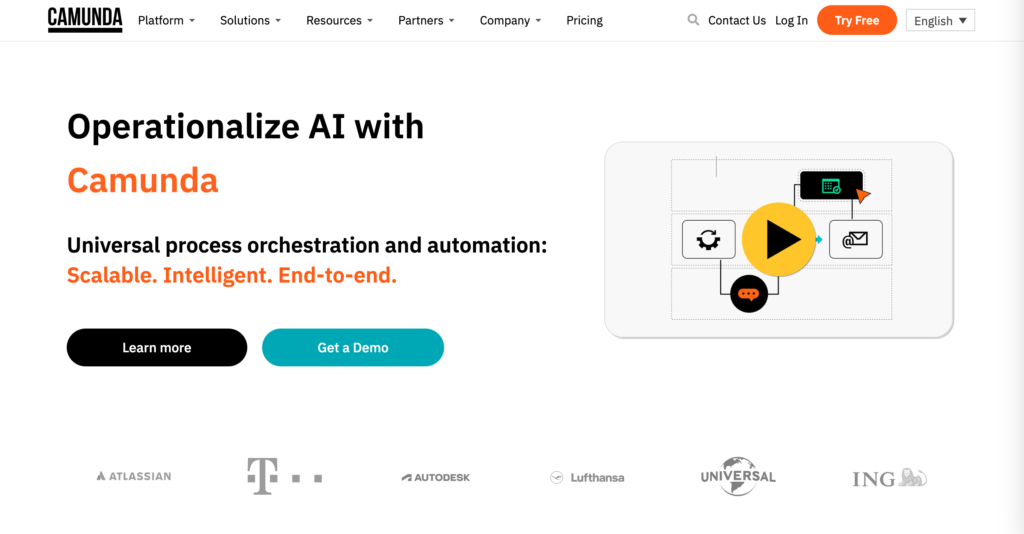
Camunda is one of the top-notch automation tools that simplify complex business processes to deliver smooth employee and customer experiences. It models business processes – whether simple or complex – with BPMN and DMN.
Particularly, the platform integrates a Modeler and AI-powered Copilot, combined with BPMN and DMN standards, to design a simple or complex business process with logic. Accordingly, when a process instance is initiated, Camunda will follow the defined workflow to implement the task.
AI Agents are also integrated into business processes to support human decision makers. For example, they help process customer inquiries, review transactions, forecast demands for supply chain optimization, and handle tickets automatically.
Further, Camunda offers a drag-and-drop Form Builder and an AI Assistant to create, customize, and embed forms for must-do tasks into a BPMN process model. Then, you can leverage Tasklist to automatically assign work to your team.
Pricing: Choose Camunda’s pricing options based on your hosting demands. Whether you want to host the platform on Camunda’s server or your own infrastructure, you’ll receive a free plan for non-commercial use. You can upgrade to paid plans, including Starter (with €99/month) and Enterprise.
10. Axon Ivy
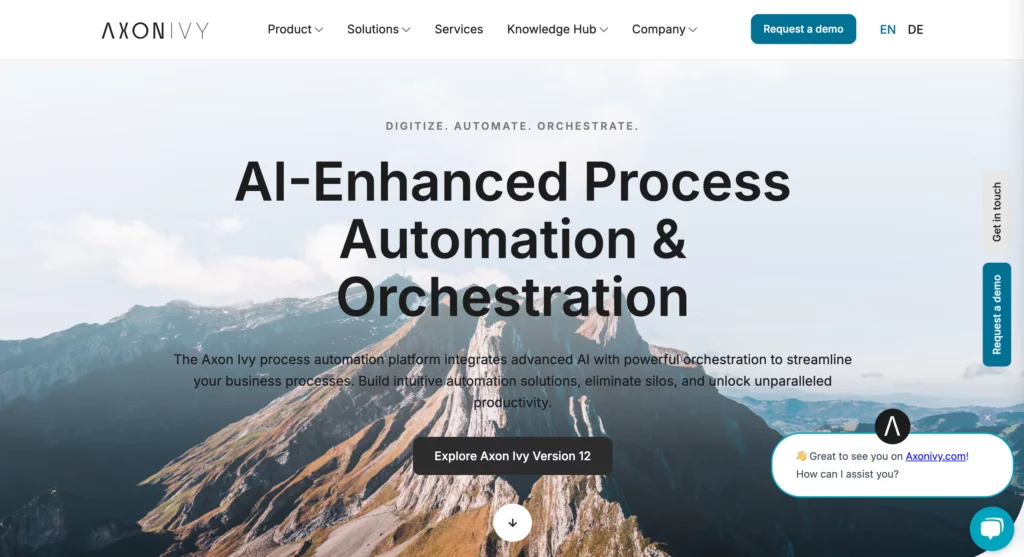
Axon Ivy is the last business process automation tool we want to mention in this list. The platform offers powerful capabilities to facilitate different workflows, from accounting and planning to customer service and operations. Particularly, its BPMN Process Engine allows you to drag, drop, and customize elements as well as integrate standard connectors to build, run, and debug business processes easily. This removes the need for coding knowledge.
Axon Ivy enables Adaptive Case Management (ACM) to balance structured and unstructured workflows. This functionality divides your individual process into different stages, which allows for triggering process steps based on conditional logic and gaining real-time insights into the steps. Further, the platform integrates IDP (Intelligent Document Processing) to classify and retrieve data from complex documents.
Pricing: Axon Ivy offers a free plan for one user. It also comes with three paid plans, including Professional Designer at €49/user/month, Workflow User at €9/user/month/application, and Portal User at €2/user/month/application.
Conclusion
Now, after this article, you may have a better understanding of business automation tools, from their definition and importance to the best platforms. However, among a multitude of tools in today’s market, you should consider different factors (like your team’s technical expertise, your process’s complexity level, or your budget) to choose the most suitable one.
Do you want to build custom software to automate your business processes, and are you looking for a trusted, experienced partner to outsource the project? Designveloper is here to help!
As one of the leading software development companies in Vietnam, Designveloper has deep expertise in 50+ technologies and experience in 100+ projects across industries (like healthcare or finance). We work in accordance with a structured workflow, starting with evaluating your business requirements and challenges thoroughly. This helps us design and implement tailored solutions that fit your business and bring measurable outcomes.
Contact us now to upgrade your business processes to new heights! Also, don’t forget to follow us on Facebook, X, and LinkedIn to receive the latest news about business process automation and other relevant topics!






Read more topics















































